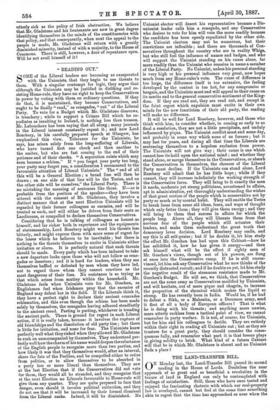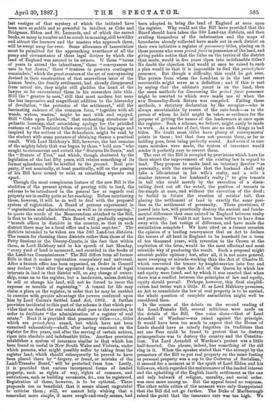THE LAND-TRANSFER BILL.
ON Monday last, the Land-Transfer Bill passed its second reading in the House of Lords. Doubtless the near approach of so great and no beneficial a revolution in the tenure of land in England can only be contemplated with feelings of satisfaction. Still, those who have once tasted and enjoyed the fascinating rhetoric with which our real-property law is overlayed, cannot but feel at the same time something akin to regret that the time has approached so near when the
last vestiges of that mystery of which the initiated have been men so subtle and so powerful in intellect as Coke and Bridgman, Eldon and St. Leonardo, and of which the sacred books, so many in number and so occult in meaning, still bewilder and attract the learners and the masters who approach them, will be swept away for ever. Some allowance of lamentation must be permitted for the approaching overthrow of all the pomp and circumstance of those legal devices by which the land of England was assured to its owners. If those "terms of years to attend the inheritance," those "conveyances to uses to bar dower," those "trustees to preserve contingent remainders," which the great creators of the art of conveyancing devised in their construction of that marvellous issue of the human brain, the family settlement, had already disappeared from actual use, they might still gladden the heart of the lawyer as he encountered them in his researches into title. Still the "grantee to uses," still that most modern but none the leas impressive and magnificent addition to the hierarchy of devolution, " the protector of the settlement,' still the fascinating cadence of the common form, "together with all woods, waters, wastes," might be met with and enjoyed. Still "Coke upon Lyttleton, ' that enchanting storehouse of pedantic learning, that astonishing apology for the petrified customs of rude Teutonic tribes conveyed in the language and inspired by the notions of the Schoolmen, might be read by the student with some pretence of obtaining thence a practical result. With Lord Halsbury's Bill, however, the last remains of the mighty fabric that was begun by those "bold men " who sought to circumvent and outwit the "Statutes De Donis," and the "Statute of Uses," and which, though shattered by the legislation of the last fifty years, still retains something of its former splendour, will be levelled to the ground. Real pro- perty, if not nominally, at least practically, will on the passing of his Bill have ceased to exist as something separate and apart.
Though the most conspicuous feature of the new Bill is the abolition of the present system of proving title to land, the reforms to be introduced in the general law as regards real property are in reality quite as far-reaching. Before mentioning these, however, it will be as well to deal with the proposed system of registration. A Board of persons experienced in "organisation and administration, as well as in conveyancing," to quote the words of the Memorandum attached to the Bill, is first to be established. This Board will gradually organise "branch offices in districts in the country, so that in each district there may be a local office and a local register." The districts intended to be taken are the 380 Land-tax districts. The reason for choosing these districts rather than those of the Petty Sessions or the County-Courts, is the fact that within them, as Lord Halsbnry said in his speech of last Monday, "every yard of land is measured, and recorded in the books of the Land-tax Commissioners." The Bill differs from all former Bills in that it makes registration compulsory and universal. After a branch office has been organised, an Order in Council may declare "that after the appointed day, a transfer of legal interests in land in that district will, on any change of owner- ship, come on to the register, but a landowner, unless desiring to sell or change his land, will not be forced to incur the expense or trouble of registering." A tenant for life may claim a place on the register, in order that he may be enabled to exercise with greater advantage the powers conferred upon him by Lord Cairns's Settled Land Act, 1882. A further provision incidental to this part of the scheme is that which pro- vides that on death the real estate shall pass to the executor, in order to facilitate "the administration of a register of real estate." Next it is provided that possessory titles—i.e., titles which are prinui-facie sound, but which have not been examined exhaustively—shall, after having remained on the register for five years, and after the serving of certain notices, ripen into absolute and indefeasible titles. Another provision establishes a system of insurance similar to that which has been found so useful in New South Wales and Victoria, under which persons, who might possibly suffer by taking from the register land, which should subsequently be proved to have been placed there by "forgery, or fraud, or mistake of the Land-Transfer Board," will be protected from loss. Lastly, it is provided that various incorporeal forms of landed property, such as rights of way, rights of common, and restrictions, such as building covenants, &c., can be registered. Registration of these, however, is to be optionaL These proposals are so beneficial, that it seems almost ungrateful to criticise them ; still, we cannot help wishing that a somewhat more simple, if more rough-and-ready means, had been adopted to bring the land of England at once upon the register. Why could not the Bill have provided that the Board should have taken the 380 Land-tax districts, and then availing themselves of the information and the maps of boundaries already collected have made out in each district on their own initiative a register of possessory titles, placing on it those persons who were primei facie in possession of the land, and giving public notice that the titles on the terrier of the district thus made, would in five years ripen into indefeasible titles ? No doubt the objection that would at once be raised to such a plan would be that it is impossible to find the prinici.facie possessor. But though a difficulty, this could be got over. The person from whom the Land-tax is in the last resort recoverable might serve as a definition ; and if this is met by saying that the ultimate resort is on the land, then the same methods for discovering the prinid facie possessor might be resorted to which were made use of when the new Domesday-Book Return was compiled. Failing these methods, a statutory declaration by the occupier—who is always ascertainable by reason of the rate-book—as to the person of whom he held might be taken as evidence for the purpose of getting the names of the landowners at once upon the register. Such a scheme, we believe, might easily be made to work. As a matter of fact, there are no such things as bad titles. No doubt most titles have plenty of conveyancers' points in them ; but that does not prevent them, as far as holding goes, from being perfectly sound. And even if in rare cases mistakes were made, the system of insurance would render it perfectly easy to correct them.
The rest of the Bill is occupied by provisions which have for their object the improvement of the existing law in regard to land. They propose to make land on intestacy devolve "as personalty, with the exception that the husband shall only take a life-interest in his wife's realty, and a wife a similar interest in her husband's realty ;" to give tenants in tail who could merely by the execution of a disen- tailing deed cut off the entail, the position of tenants in fee-simple at once, and without the execution of the deed ; to forbid in future the creation of estates' tail, thus placing the settlement of land in exactly the same posi- tion as the settlement of personalty. These provisions, if passed into law, will practically destroy the ancient and funda- mental difference that once existed in England between realty and personalty. Would it not have been better to have done away with the last vestige of difference, and have made the assimilation complete I We have cited on a former occasion the opinion of a leading conveyancer that an Act to declare the tenure of all land in England to be leasehold for a term of ten thousand years, with reversion to the Crown at the expiration of the term, would be the most effectual and most scientific way of producing the result. Such a proposal might astonish public opinion ; but, after all, it is not more general, more sweeping or miracle-working than the Act of Charles II. which converted the tenure by knight-service into free and common socage, or than the Act of the Queen by which law and equity were fused, and by which it was enacted that when there was a conflict between the principles of law and equity, equity should prevail. Perhaps, however, this final simplifi- cation had better wait a little. If, as Lord Halsbury promises, an Act to consolidate the law of real property is to be carried, the whole question of complete assimilation might well be considered then.
In the course of the debate on the second reading of the Land-Transfer Bill, several criticisms were made on the details of the Bill. One voice alone—that of Lord Arundel' of Wardour—was raised against the principle. It would have been too much to expect that the House of Lords should have so utterly forgotten its traditions that not one Peer could be found to protest that to destroy primogeniture was to destroy the country and the Constitu-
tion. Yet Lord Arundell of Wardour's protest was a little half-hearted. One phrase, indeed, has something of the old
ring in it. When the speaker stated that "the attempt by the promoters of the Bill to put real property on the same footing as personal property was a sop to the Cerberns of Socialism," it seemed for a moment as if the spirit of Lord Eldon and his followers, which regarded the maintenance of the landed interest and the upholding of the English family settlement as the one and only bulwark of religion, morality, and social order.
was once more among us. But the appeal found no response. The other noble critics of the measure were only disappointed that the Bill did not go further. The Duke of Marlborough raised the point that the insurance rate was too high. We
believe, however, that he was mistaken in his calculation of the amount that would have to be paid. If reference is made to Mr. Brickdale's able work on "The Registration of Title to Land," it will be seen that the Colonial system which is there described, and which the Government have adopted with only small modifications, can be worked without inflicting any serious burden on the purchaser. Lord Selborne wanted codification of the law of real property, and Lord Herschell wished for further limitations on the power of settle- ment. On the whole, no one can deny that the Bill. does Lord Halsbury and the Government credit. To effect such a change as is proposed by the registration clauses without spending public money, and yet without doing injury to the landowners' interest, is no easy task ; and therefore, whatever imperfections of detail there may be in the scheme must in a great measure be set down not to want of capacity or unwillingness for reform in the promoters of the Bill, but to the inherent difficulties of the subject.




































 Previous page
Previous page